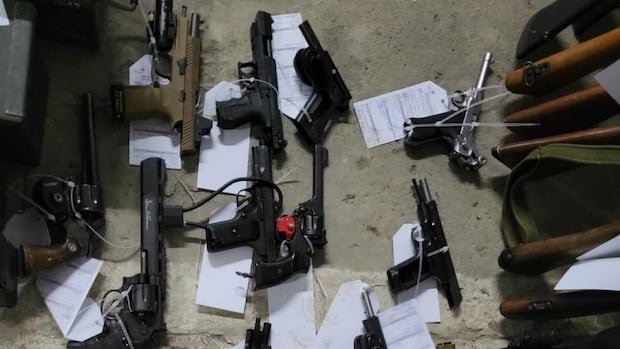In the early hours of July 8, members of the Royal Canadian Mounted Police (RCMP) apprehended four individuals, two of whom are currently serving in the military, for an alleged conspiracy to establish an anti-government militia. The authorities assert that the group had amassed an arsenal of weapons, including numerous firearms and 11,000 rounds of ammunition, with intentions to forcibly seize a piece of land near Quebec City.
Three of the suspects, including one military member, are now facing terrorism charges, with a bail hearing scheduled for Thursday. This operation leading to the arrests is noted for its unprecedented nature, marking the first instance of an active Canadian military member being charged with terrorism-related offenses.
The quantity of weapons confiscated in this case is reported to be among the largest ever recorded in a Canadian terrorism inquiry, as stated by Jessica Davis from Insight Threat Intelligence consultancy. While instances of suspected far-right extremism within the Canadian Armed Forces are not new, with a history spanning over three decades, the military’s responses to these issues have been inconsistent.
The military’s initial confrontation with extremism occurred after Canadian paratroopers mistreated and killed a 16-year-old boy named Shidane Arone during a peacekeeping mission in Somalia in 1993. Following this incident, the government disbanded the airborne regiment and curtailed the subsequent inquiry into deeper unit problems that contributed to the tragedy.
Despite revelations of extremist activities within the military over the years, actions taken against suspected cases of extremism and hateful conduct have been infrequent. Internal documents obtained in 2019 indicated that out of 50 suspected cases of hateful conduct between 2013 and 2018, only four resulted in disciplinary actions, with warnings, probation, or releases being more common outcomes.
Efforts to address extremism within the military have gained traction in recent years, with the establishment of a new system to monitor hate incidents among military personnel. Since 2020, there have been 120 reports of military members promoting or exhibiting hate, as well as 16 reports of involvement in hate groups. The military has shared this data with CBC News to highlight its tracking mechanisms.
The military’s approach to handling extremism has been further scrutinized, particularly in light of recent incidents such as the discovery of offensive content within a reservists’ Facebook group in Ottawa. Despite ongoing efforts to address extremism, challenges persist, and further improvements are deemed necessary by experts and officials involved in combating extremism within the Canadian military.

